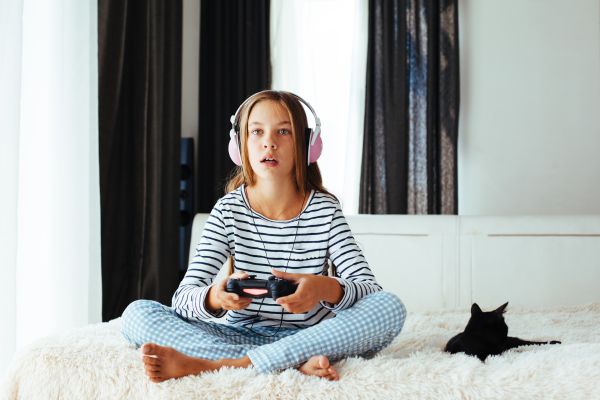
Is it safe for children to have online friends?
In the digital age, online friendships have become a significant part of our children’s lives. Today’s world can make it hard for children to play outside and make friends that way; we are more concerned about safety and more aware of ‘stranger danger’. There are more cars on the roads and not as many open spaces to play in. So for many children today, it’s easier for them to make friends online.
Understandably, you may be worried about your child making and maintaining friendships online, and this does come with some risks, but it’s also important to understand the benefits for children so you can give your child guidance in navigating the online world.

Whether it’s online gaming or social media, there are many ways that having online friendships can be a positive force in a child’s life;
Maintaining Relationships:
Being online enables children to maintain relationships with friends and family who they may not see in person very often, allowing them to stay in touch and share what is going on in their lives easily.
Different Perspectives:

Being online and interacting with others allows children to broaden their knowledge. The many different ideas being shared across various online platforms exposes them to a range of perspectives and viewpoints, and gives children the opportunity to discover new areas of interest they may not previously have been aware of.
Accessing Support:
For some children, being online can be a place where they can seek support if they are going through something they feel they cannot talk to those close to them about. It can provide an avenue to share their concerns and receive advice from others who may have experienced similar situations.
Removing Boundaries:

Connecting with others online breaks down barriers to meeting and keeping in touch with people, allowing connections to be made without geographical barriers. This is especially important for children who have a disability or feel distant from others in their local area, giving them a chance to connect with like-minded people who share their thoughts and hobbies.
Communication & Technical Skills:
The online world is now part of everyday life, so it’s important for children and young people to be familiar with communicating online to prepare them for the future, whether that’s in their future workplace or simply interacting with friends and family.
Although there are many benefits of being online for children, it is also important to be aware of the potential risks – such as the possibility of them being exposed to inappropriate content, online grooming, cyberbullying, and screen addiction. As a parent, it is crucial to understand how to guide your child in forming healthy online relationships while safeguarding their wellbeing. Let’s take a look at how to reduce those risks and empower your child to be safe online;
Open Communication:

Having an open dialogue with your child is essential to be able to educate them about the potential dangers online. Start by expressing your interest in what they do online and make sure they feel comfortable coming to you with any concerns or questions they may have. Children with strong social and emotional skills will be better equipped to safely navigate the online world.
Education:
Emphasise the significance of privacy and ensure your child understands the importance of not sharing personal information with strangers online. Encourage them to immediately let you or a trusted adult know if they feel uncomfortable about anything they have experienced online. Help them to understand that some people may not always be who they claim to be online. Talk to them about the difference between genuine friendships and those that might be manipulative or harmful.
Clear Boundaries & Real World Friendships:

Establish guidelines together with your child regarding screen time, which online platforms they are allowed to use, and the importance of balancing virtual interactions with real-world ones. Regularly seeing their friends in person is vitally important for their social and emotional development and for developing their communication skills.
Monitoring & Privacy:
While respecting their privacy, keep an eye on your child’s online activities. Research and understand the platforms they are using and consider using parental controls or privacy settings. These will help you decide what time of day your child can go online and how long for, create content filters to block apps that may have inappropriate content, and manage the content different family members can see.
Be a Good Role Model:
Show your child healthy digital habits, such as setting a limit on how much time you spend online and maintaining strong real-life relationships by spending time with friends and family. You are a huge influence in your child’s life, so lead by example to show them how to have a healthy relationship with the digital world.

Here are some easy-to-follow steps you may find useful to share with your child about what they should keep in mind each time they go online;
- Always check with your parents before going online.
- Don’t give out personal information when online.
- Never arrange to meet someone in person that you have only sent messages to online.
- Don’t open emails from people you do not know.
- Never send pictures of yourself to someone you have only met online.
- If you have a mobile phone, do not give your phone number to someone you have not met in the real world.
- It’s a good idea to use a nickname rather than your real name when you are gaming or talking to people online.
- Remember that your online friends are still strangers, even if you have been talking to them for a long time online.
By staying informed and working together with your child, you can help them to navigate online friendships safely and responsibly. Regular and frequent conversations and ongoing education will equip them with the tools they need to make informed decisions and build a positive online presence.


